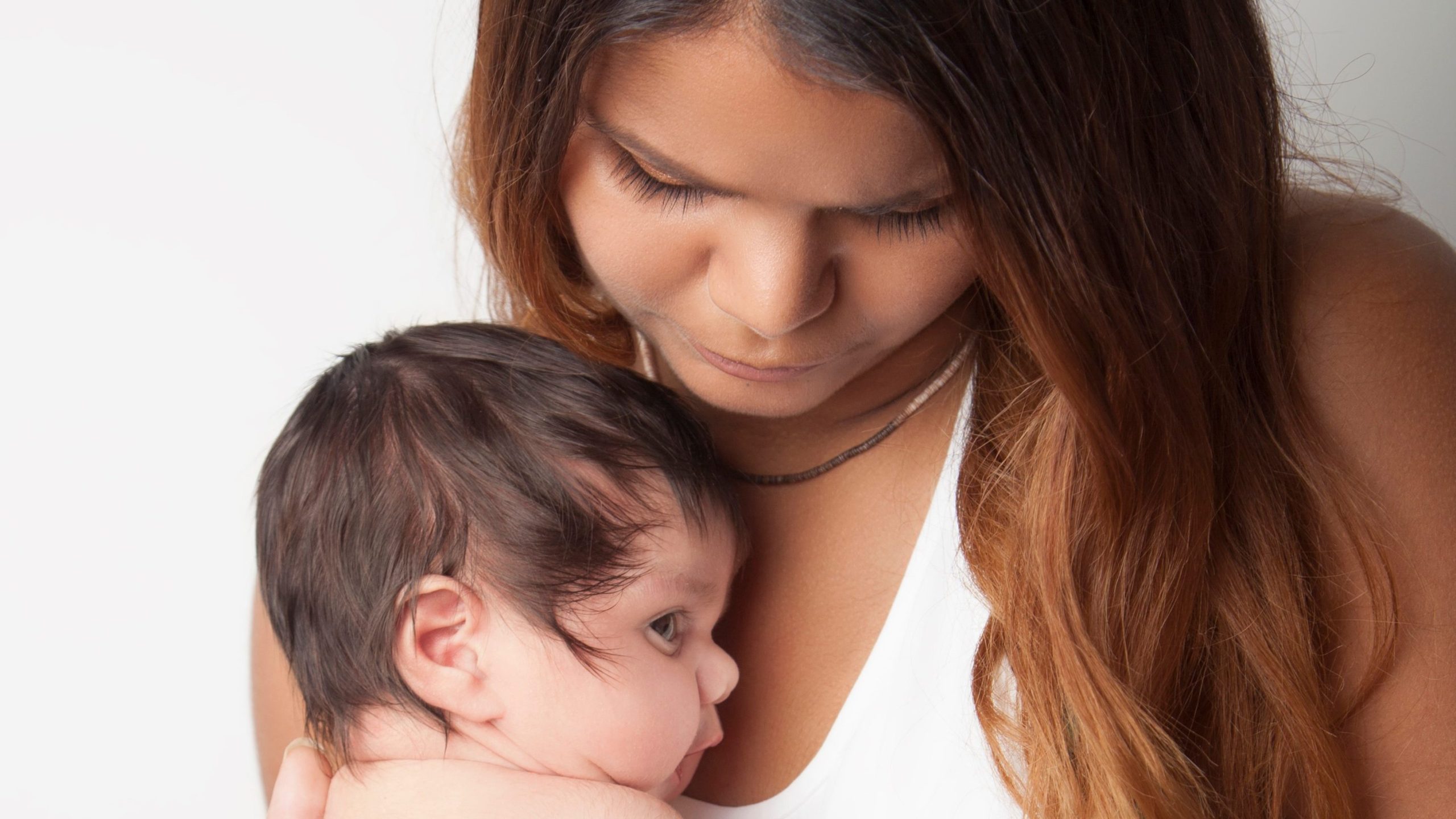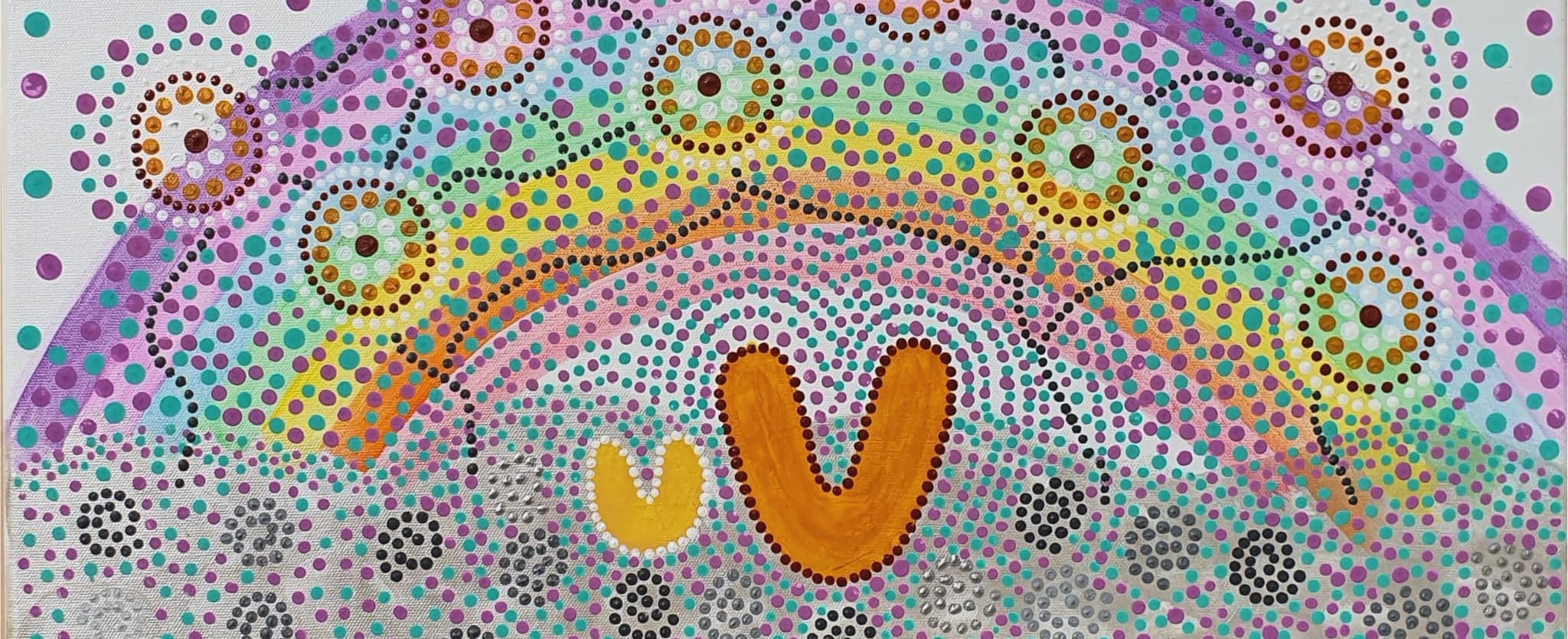This blog was authored by Joy Makepeace BAppSc; GradDipEd; MSocSc, National ForWhen Aboriginal Community Engagement Practice Lead (ForWhen Yarning Lead).
Joy is a proud Kamilaroi Murrawarri woman and has 3 adult children. She owns her own Reflective Practice Supervision business called Change of Art, Mind and Body and is an inaugural member of the First Nations State Voice to Parliament representing the Yorke Mid North Region in South Australia and has worked in Aboriginal Education and Health for the past 30 years.
Posted: 8 July 2024
Are you a pregnant Aboriginal or Torres Strait Islander woman or have a baby under 12 months old?
Having a baby is a time filled with many emotions and changes. We have all seen a pregnancy and birth in movies, or maybe you have close friends and family who you supported during their pregnancy. But do you really know what happens to our mind, body, and spirit when we are pregnant and after we’ve had the baby?
Traditionally in Aboriginal societies this was very much women’s business and even today many Aboriginal women believe it still is “women’s business”.
What happens if we don’t live like we used to traditionally live, with our Aboriginal family and extended family? Perhaps our kinship systems aren’t as connected and supportive as they once were. We used to live on country and work together as a whole Aboriginal community, and it was the responsibility of the community to raise a child with Grandmothers being the keepers of our sacred birthing knowledge and practices. It wasn’t just up to the mum.
Did you know that 1 in 5 women experience poor perinatal mental health such as postpartum depression (PPD) or postnatal anxiety during the perinatal period. The perinatal period is from conception until the baby, otherwise known as the infant, is 12 months old. This is a very important and challenging time for the birth mum, the baby, and families.
Don’t know what you don’t know!
As a society, we don’t acknowledge or openly discuss perinatal mental health for Aboriginal women and this may be the first time you are reading or hearing about perinatal mental health issues for Aboriginal women. Without knowing or having access to information about having a baby, you may be feeling isolated and alone and that makes you feel scared and anxious. You know that you’re nervous, but deep down you don’t know why? Your body is reacting to an unknown fear and your brain is trying to make sense of a situation that feels unfamiliar. I am here to tell you that these feelings are ok and are all a part of the pregnancy and birthing journey.
But, who do you turn to when all the people you think can help, don’t really know how to best help? You’re shame and feel overwhelmed, you’re feeling exhausted and what is supposed to be the best time of your life feels like the worst time of your life. Guilt looms over you and this overwhelming feeling is unbearable, and you just need answers. You want to run away, but every instinct tells you that you need to stay. You hear your baby crying and know that it’s your sole responsibility to care for them, but you just wish someone else would do the job for you.
Wanting to run, but feeling trapped, wanting help, but where do you start? Who can help, how do you get the help? Where do you find the help?
What I’ve just described is an example of an Aboriginal woman who’s possibly experiencing poor mental health during the perinatal period? You may know it more as “baby blues”, postpartum depression or depression and anxiety. There are answers and there is help, let’s look at some culturally safe solutions together.
Key Highlights
1 in 5 women experience poor perinatal mental health such as postpartum depression (PPD) or postnatal anxiety during the perinatal period. The perinatal period is from conception until the baby, otherwise known as the infant, is 12 months old. This is a very important and challenging time for the birth mum, the baby, and families.
Why is the perinatal period so important?
The perinatal period is so important because during this time there are many things that can impact the infant and mother’s physical, mental, social, emotional, and spiritual health. In fact, there are so many things that are happening to your body, most of the time you are blissfully unaware of them. Until they make themselves known to you and you can no longer ignore them.
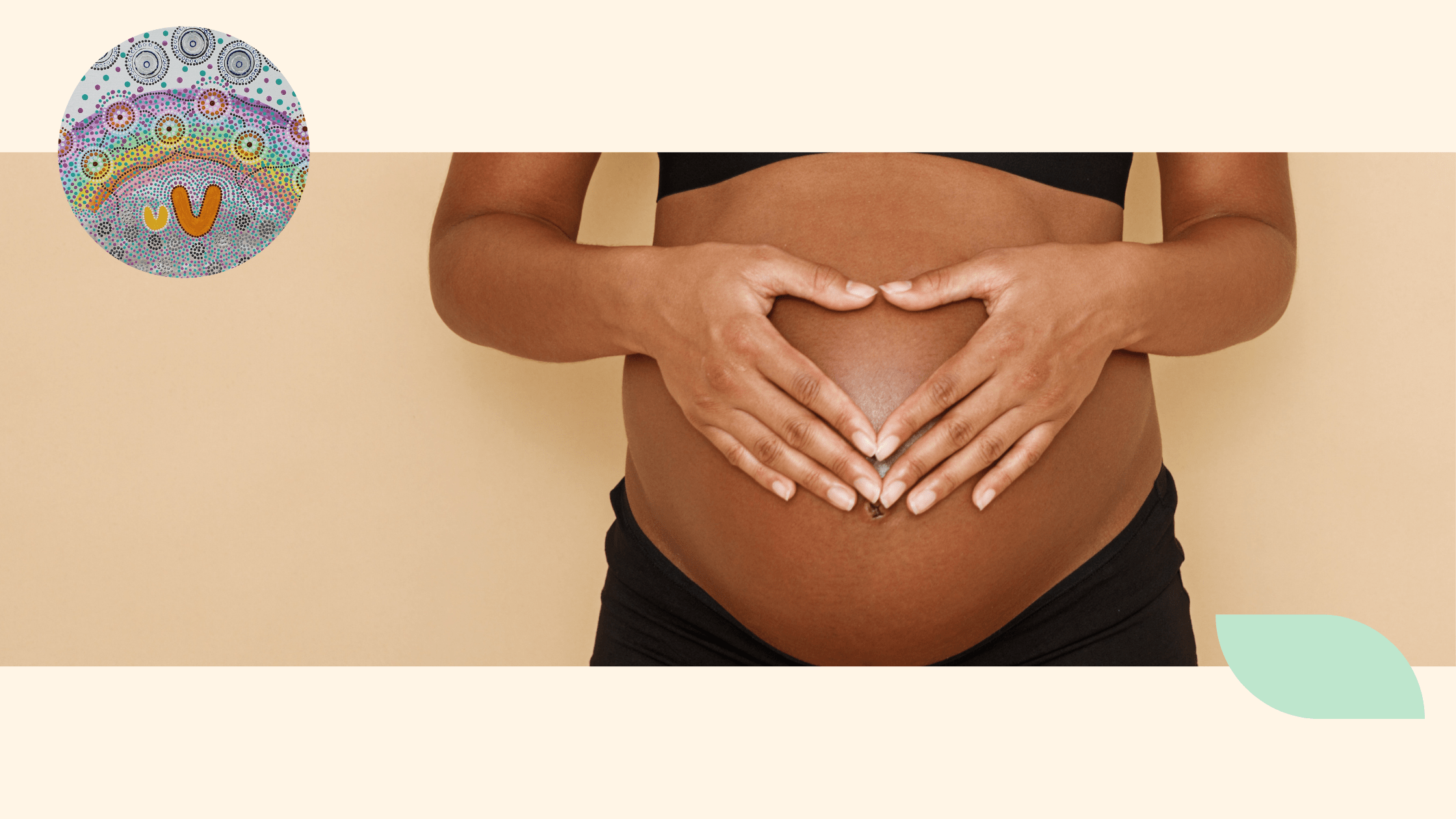
What is Baby Blues and/or postpartum depression?
Often when we have given birth your hormone levels go up and down, and some women get what is known as the “baby blues”. For many women, the baby blues quickly go away. However, if the symptoms are more intense, feel bigger, last longer and they are affecting your ability to care for yourself or your baby, then you may be experiencing postpartum depression and anxiety. Symptoms of postpartum depression include:
- Depressed mood or big mood swings
- Trouble forming a bond with your baby
- Wanting to be alone
- Feeling tired or have no energy to do things
- Thoughts and feelings about not being a good parent
- Feeling hopeless,
- Feeling wild and angry
- Terrible anxiety and panic attacks
ForWhen have a great article that you can read HERE that goes into more in-depth detail about the signs of postpartum depression for you to look for.
Why did I get postpartum depression?
There is no single cause of postpartum depression, but genetics, family history, physical changes, emotional issues, previous mental health conditions, and other factors may all increase the risk of experiencing postpartum
How long will postpartum depression last?
No one knows exactly how long postpartum depression and anxiety can last. It can appear days or even months after delivering a baby and it can last for many weeks or months if left untreated.
Postpartum depression left untreated can lead to further health complications, causing unnecessary stress on your relationships, and can affect your bond with your baby. This is why it is vitally important to seek help early to address these mental health concerns as soon as possible.
How do I know that I need to seek help?
Being aware of how you are feeling and knowing the symptoms of postpartum depression and anxiety, is important during this time. Most health professionals will recommend that after you have given birth that you go back to your doctor for a 6-week postpartum health check. However, this is just a guide and if you are feeling physically sick or emotionally unwell at any time and it is a feeling that won’t go away, no matter what you do, then you need to seek medical help as soon as possible.
There are many places to ring or go but the good news is, you don’t need to know where or how to find all these services, because in Australia we have services like ForWhen (1300 24 23 22) who have people to help you find or navigate your way to the right perinatal mental health expert or place.
What are some potential triggers and fears?
Researchers (Chamberlain, C et al., 2019) who are working on the Healing the Past by Nurturing the Future Perinatal Screen Tool Development Project state that Aboriginal people in Australia are particularly affected by complex trauma, following a legacy of historical trauma, which includes systematic removal of Aboriginal children from their families and ongoing discrimination. As Aboriginal people we are constantly aware of our traumatic shared history and experiences. This is a constant trigger that also leads to a genuine fear of the potential of child removal.
What we want to reassure you, is that non-judgemental, culturally safe, trauma-informed, culturally specific help is available for you and your baby.
Key Highlight
Postpartum depression left untreated can lead to further health complications, causing unnecessary stress on your relationships, and can affect your bond with your baby. This is why it is vitally important to seek help early to address these mental health concerns as soon as possible.
What can I expect from a ForWhen Perinatal Mental Health phone clinician?
ForWhen is a perinatal and infant mental health care-navigation phone service. This means we get you to the support you need. We will talk to you about how you are feeling and what else is going on for you. We may ask you a little about any past mental health to get a better idea of who you are and what you’ve been through.
If you’d like someone else to be on the call with you, just let us know. If you’d like an elder or family member or Aboriginal Health Worker to be involved, just let us know. They can even call for you if you prefer and with your consent can help you yarn with us. We can help connect you to Aboriginal services or general services. The choice is all yours.
The person you speak to is a health professional, who has a deep understanding of the perinatal time and the impact on mental health. They will give you an opportunity to express how you are feeling and allow you to feel heard. They will yarn with you to help you make choices on the type of support you need and help connect you to that support. The process to get you referred and connected to the service usually takes about a month and involves a few phone calls to you from start to finish.
We may suggest you see a perinatal mental health psychologist or counsellor for some sessions of help. These people can sometimes be called perinatal mental health clinicians.
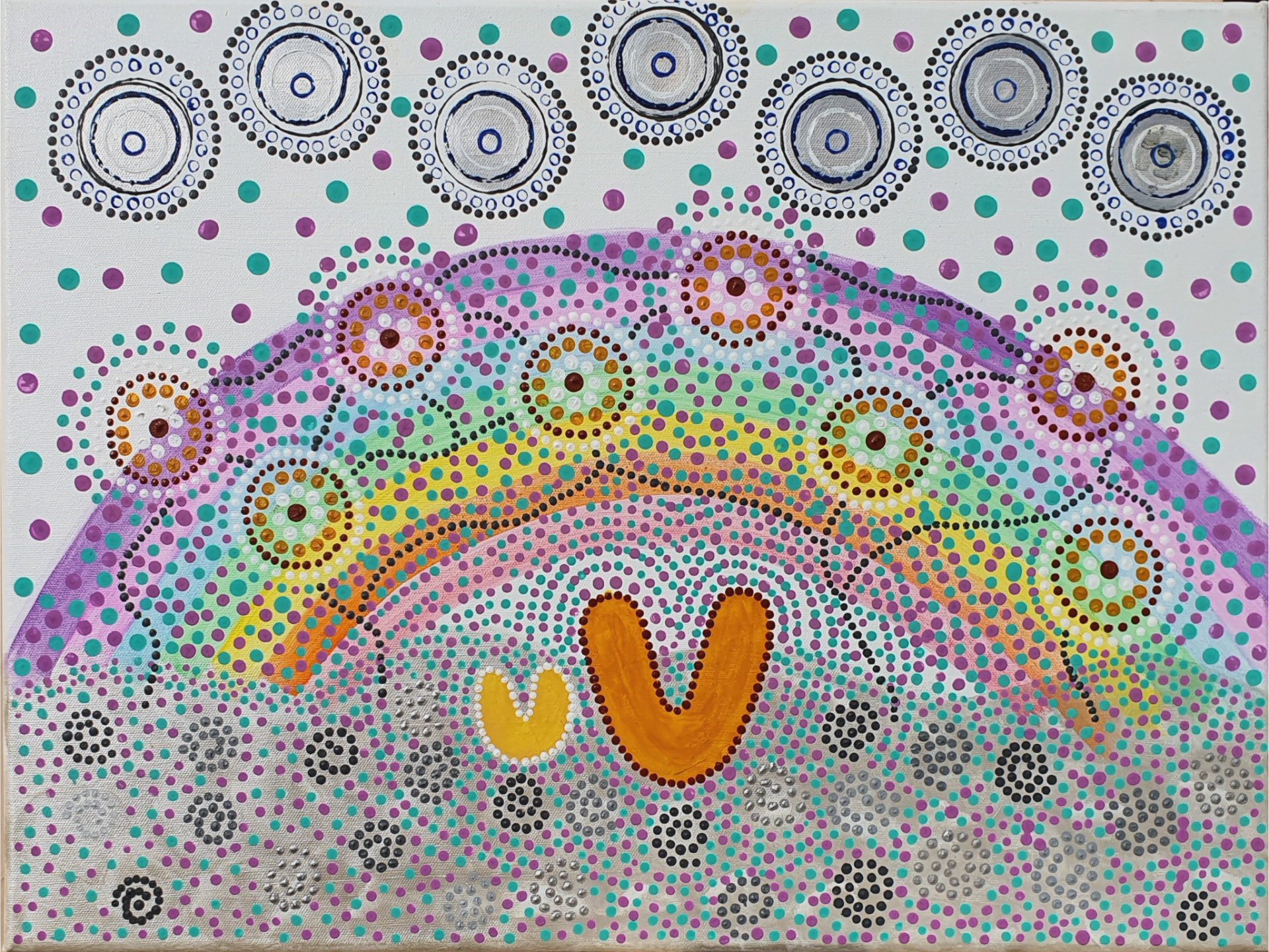
ForWhen artwork by Joy Makepeace. This is a story of a new mum (family) and baby and their journey together through pregnancy and new parenthood. Sometimes when our babies are born we have to navigate some complex circumstances, including making connections with essential mental health services. Often it can be a very turbulent time and it may feel overwhelming. The rainbow in the background provides a vision of hope, inclusivity and understanding. ForWhen ensures that you are surrounded and connected to services as necessary. The seven stars in the sky will help guide you, look over you and support you while you navigate your way together to better mental health.
Permission has been given by the artist to feature their artwork in this blog article. This image is not to be replicated, downloaded, or used for personal or commercial purposes.
Why do I need a perinatal mental health clinician?
There has been much research conducted around the world about the importance of the first 1000 days, from conception to two years of age, of a baby’s life. Unfortunately, not many Aboriginal and Torres Strait Islander people have heard about this research and may not realise how this time hugely impacts on a child’s ability to grow, learn, and thrive. The first 1,000 days of a baby’s life are when their brain begins to grow and develop and when the foundations for their lifelong health are built. Our traditional mid-wives and grandmothers knew this information.
Most people are aware that it is important to provide your baby with good nutrition, safety and security and a loving home environment, but many people are only just beginning to learn that stress, trauma, poverty, and family and domestic violence, including before the baby is born, can have long term negative health effects on their babies, especially during their first 1000 days.
Perinatal and Infant Mental Health clinicians are passionate about helping mothers and families to learn how we can give our babies the best start in life. They want to work with you in a way that is trauma informed, culturally sensitive, and safe for you and your infant. They have specific experience in understanding mental health at this time with all the adjustments you are making in being pregnant or having a new baby. They can help you to develop a good bond with your baby and help you with your mental health so you can be the best mum you can be.
Key Highlight
The first 1,000 days of a baby’s life are when their brain begins to grow and develop and when the foundations for their lifelong health are built. Our traditional mid-wives and grandmothers knew this information.
What about our traditional Aboriginal Healers?
There are over 500 different Aboriginal nations and language groups around Australia. One of the most known words for a traditional Aboriginal healer would be Ngangkari, which is the name of the traditional healers, who are the Anangu (Aboriginal) people who live mostly in the Anangu Pitjantjatjara Yankunytjatjara of South Australia and the Western Desert region, which includes parts of the Northern Territory and Western Australia.
When you have a baby, it can be a very challenging time and despite seeing a doctor, nurse, and Aboriginal health practitioner you may be looking for something more culturally relevant and something that helps you and your baby both spiritually and mentally. We know that when our spirit (Kurunpa) isn’t right then we aren’t feeling emotionally and mentally right. Many mainstream health services work closely with their local Aboriginal community-controlled health organisation, who often have close connections and links with traditional Aboriginal healers. Speak to your local Aboriginal Health Service if you would like to seek additional cultural healing with a Ngangkari.
ForWhen has built relationships, and will continue to build relationships, with key National and local First Nations organisations to ensure we can connect you to the services that will meet your cultural and spiritual needs during this time.
Some of the organisations we continue to connect with include:
Summary
Since colonisation, traditional birthing practices on country have slowly declined. Traditional cultural midwives have been replaced with western midwives and thousands of years of childbearing cultural knowledge has vanished. Birthing on country is rare and pregnant Aboriginal women are left with no options other than to travel to the higher populated regions to birth in a sterile hospital. In doing so many Aboriginal women are taken away from their homelands, cultural connections, safety, kin, cultural supports, and family. Leaving behind everything that is familiar and birthing in a foreign and frightening surrounding often leads to more unnecessary birthing trauma. ForWhen acknowledges this loss and want to work closely with you and your baby to help avoid or manage these big feelings that can trigger perinatal mental health concerns.
For Aboriginal people, healing is a holistic process, which addresses mental, physical, emotional, and spiritual needs and involves connections to culture, family and land. We have known this forever. We have survived for 60,000+ years and we have also successfully birthed and raised our babies to become strong, healthy, and thriving children. Times have changed and we have endured much trauma and circumstances. We know these factors impact on our mental, physical, and spiritual health, as well as our well-being.
In the past, Aboriginal mothers have had our voices, rights, freedom, and children taken from us and that was called the Stolen Generations. During this NAIDOC week (7-14 July 2024), we remember our grandmothers, our mothers, and our babies. We are “Blak, Loud and Proud” and we will keep the fires burning, as we know that where there is fire there is smoke. Smoke cleanses our spirits and helps us to heal. Let the cultural healing begin!
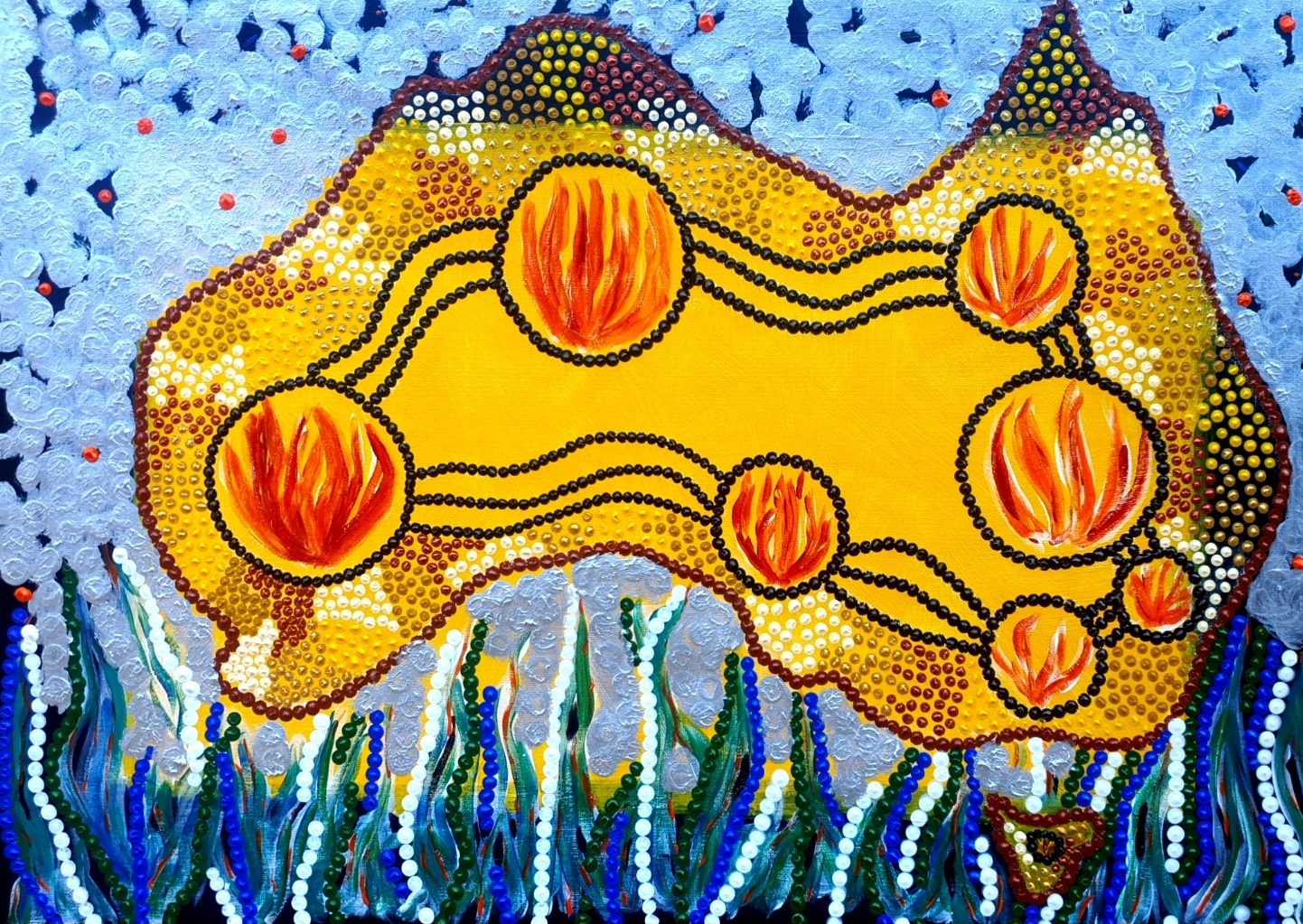
Permission has been given by the artist to feature their artwork in this blog article. This image is not to be replicated, downloaded, or used for personal or commercial purposes.
